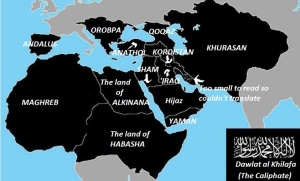The ISIS group, which has previously seized part of the territory of Iraq and Syria, announced on June 29th the establishment of an Islamic caliphate and called upon jihadists of the world to stand with it in loyalty. The organization, previously named “The Islamic State of Iraq and the Levant” (ISIL), changed its title to “The Islamic State.” Its representative Abu Mohammed al-Adnani, in his address on Youtube mentioned for the first time the caliphate’s full name – Abdullah Ibrahim Ayad al-Samarraie.
At the same time as the caliphate was announced, a five-year plan to seize vast territories in Africa, the Middle East, and even Europe appeared on the Internet network. According to the map, besides the Arab-world countries Israel, Iran, Turkey, Afghanistan, and Pakistan, the new vision includes Spain, Portugal, Cyprus, Greece, the Balkans, Hungary, Romania, Moldova, part of Ukraine, Crimea, the entire Caucasus, including the northern part, the Volga, part of India and a considerable part of Sub-Saharan Africa.
As is well known, Iraqi Sunnis have joined ISIS, disgruntled by prime minister Nouri Al-Maliki’s politics, militants from Saddam Hussein’s former army, as well as numerous small terrorist groups.
Yesterday jihadists continued active hostilities in west and north-west Iraq. After a few days of fighting, they seized the Syrian city Abu Kemal at the border of Syria and Iraq. Previously ISIS militants had been able to capture a city located opposite the Abu Kemal on the Iraqi side. Additionally, there is continuous fighting for the city of Tikrit, 160 kilometers from Baghdad. The UN has reported that, as a result of “acts of violence and terrorism,” at least 2,417 people have been killed and 2287 injured.
At the same time, according to the organization, 1531 of these fatalities were peaceful residents.
The faction “The Islamic State of Iraq and the Levant” stated yesterday that they have a ballistic missile on hand. ISIS fighters, having taken control of extensive Iraqi territory, posted on the Internet yesterday photos and video showing a truck driving in the Syrian city of Raqqah with a supposed R-17 missile (NATO classification – Sсud) of soviet production.
Seeing the criticism in its address by many Arab and world media outlets as support for ISIS fighters and hostility toward N. al-Maliki’s government, Saudi Arabia has announced the intention to provide humanitarian assistance to the Iraqi people, affected by the ISIS armed conflict with the Government of Iraq. In a statement by Saudi King Abdullah, support will be provided to all in need, “regardless of ethnic or religious affiliation”. Ben Rhodes, deputy national security advisor to U.S. president Obama, announced on 1 July at a briefing that Washington welcomes the intention to Saudi Arabia to provide humanitarian assistance to Iraq in the amount of $500 million. “I think this is a significant step in show of support by the people of Saudi Arabia to Iraq at this very difficult time, we believe this is a positive step forward,” – said Rhodes. He also called on Iraq’s neighboring countries to actively participate in settling the situation – in particular, “to persuade Iraq’s authorities of the need to form a government “which will represent on a broader scale all religious and ethnic communities, including Sunnis”.
In any case, no matter how events develop, ISIS will still for a long time be able to provoke armed conflict and destabilize the situation in the region; however, fighters will not be able to take over Baghdad or continue their success in a more serious way because of military assistance that’s begun on the part of Russia and Iran, as well as the placement of forces in the international arena. It is obvious now that after ISIS was stopped at Tikrit and a coalition of strange bedfellows has formed against them – Iraq, Iran, Turkey, Syria, Russia and the United States, to a certain extent even Israel, for long-term cooperation – Baghdad is not and will not be taken. But in the short term, we need to examine the possibility that the Islamists cannot be completely subdued.
It is now important for the U.S. to limit Iran to its borders, just as it is for the U.S. to limit Russia as pertains to the current situation in the Ukraine. This hotbed of tension will therefore soon stabilize, but will not be able to grow further. The most significant danger today is the fact that the armed group has received some very significant means to accomplish its goals: several billion dollars in cash, and weapons – as of yet, approximately $10 billion worth. This means that ISIS has become, theoretically, autonomous from any sponsors. And if they were under Saudi control earlier, they can now calmly throw off that control.
Unfortunately, the appeals to establish a unified caliphate may find sympathy and support among a number of elite conservative Muslim countries who want to expand their influence in international politics. Moreover, in main political world structures, for example in the UN Security Council, the Arab and Islamic world does not have permanent representation, although it has gained enormous resources, and, from the point of view of a large part of the elite, the interests of the Arab and Muslim world are not adequately taken into account by the world community and international powers. Thus, the ISIS armed struggle in Iraq world has been and will be nurtured, including by the financial, economic, political and military interests of a significant number of the Arab states of the Persian Gulf.
And the fight against radical Islam, which had been strongly stimulated by American support for the “color revolution” in the Arab world, will continue for many years in the Near and Middle East, and extend to neighboring areas as well.
Peter Lvov, Ph.D in political science, exclusively for the online magazine “New Eastern Outlook”.

